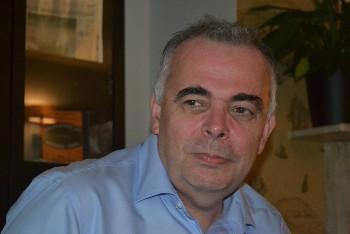You are here
SPIN: New to Practice Fellowships Scheme - Duncan Brooke, Health Education England (HEE) PG Certificate (Cert) Academic Tutor
15 December 2022
 Duncan Brooke, Health Education England (HEE) PG Certificate (Cert) Academic Tutor (2015/16 to 2021/22), talks about the PG Cert in Healthcare Practice course, one of the portfolio options available to fellows on the London SPIN – New to Practice (NTP) Fellowship Scheme.
Duncan Brooke, Health Education England (HEE) PG Certificate (Cert) Academic Tutor (2015/16 to 2021/22), talks about the PG Cert in Healthcare Practice course, one of the portfolio options available to fellows on the London SPIN – New to Practice (NTP) Fellowship Scheme.
Can you tell us more about the PG Certificate (Cert) in Healthcare Practice which is offered as part of SPIN-New to Practice (NTP) Scheme to early career GPs and general practice nurses (GPNs)?
The PG Cert in Healthcare Practice is designed to give SPIN doctors and community-based nurses the tools, time and opportunity to undertake meaningful system change.
With the academic programme as the backbone, fellows use the related masterclasses and time allocation to design and implement a system change project based around their place of work.
A select number of PG Cert course places, funded by HEE, are offered to GPs and GPNs as part of the London SPIN – NTP Fellowships scheme.
Those applying to undertake the PG Cert in Healthcare Practice need to meet eligibility criteria for the scheme, including being in a permanent salaried role and working a minimum of four sessions per week.
These are coveted places and fellows need to set aside one day a week (usually Tuesday) to complete the course over the academic year and to receive a bursary which contributes towards supporting their study, arranging advance clinical cover, where needed, with their practice and booking study leave for the taught and masterclass sessions.
Tell us more about your HEE PG Cert Academic Tutor role and how it fits with the delivery of the PG Cert in Healthcare Practice.
I’ve been the HEE PG Cert Academic Tutor for seven years (from its inception in 2015/16 until 2022) and I ran the masterclasses on the course, which complement the university-taught module sessions.
I work in collaboration with the PG Cert university tutors and our HEE subject matter expert to tailor the sessions around the theoretical aspects fellows learn in the modules.
The masterclass sessions are highly interactive and the speakers, who are experts in their field, are invited to share their real life experiences, contextualising the theory in real life scenarios, from both their clinical and leadership perspectives.
The sessions enable fellows to try out new ideas in their place of work and really explore how change management in the NHS is developed in practice.
Why is the PG Cert in Healthcare Practice so important to the SPIN – NTP Fellowship Scheme? (What does it offer the GP and GPN fellows who undertake it?)
I think the Fellowship offers three main take-aways:
- A recognised PG Certification
- Time away from the ‘coal face’, to give people valuable time to develop and implement change management projects of real worth
- The academic and practice experience that will transfer with the fellows for the rest of their working lives
This last point has meant that many fellows have gone on to be leaders in various fields.
What do fellows tell you are the most beneficial aspects of the PG Cert in HCP? How does it support their future career development?
- The theoretical basis of system changes with an opportunity to try it out in a contemporaneous manner. This gives fellows a deeper level of understanding that really serves them in their future careers.
- Opportunities to network with like-minded fellows that leads to long term working relationships across the sector(s).
What positive impact does the PG Cert in HCP have for practitioners/ wider workforce and patients?
- The PGCert programme encourage the Fellows to use the newly gained skills to identify and tackle parts of the service that could be improved leading to better outcomes for both patients and practitioners. This had led to the setting up of new or improved systems (e.g. an in reach GP lead frailty service)
- Once completed, the skills developed through a fellowship allow these individuals to positively influence change again and again.
What advice would you give to someone thinking of taking up a place on the PG Cert in HCP as part of the SPIN – NTP Fellowship Scheme?
Be prepared to be challenged intellectually in a supportive environment. If you have not undertaken Master’s level courses before the level of critical analysis is very different from undergraduate! And use the time and experience available to experiment in change management.
What’s the legacy of the PG Cert in HCP?
Many and varied! Those previously involved in the Fellowship Scheme have gone on to be system leaders in many aspects of primary-based case. For example:
- a Quality Improvement (QI) Lead for a national end of life care charity
- Primary Care Network (PCN) Lead in diabetes
- Clinical Commissioning Group (CCG) Cancer Lead
- PCN Governance Lead
- dual certification in GP and Emergency Medicine
- Associate Director in Vocational Training Scheme (GP Scheme) programme
- CCG Vice Chair
- GP SPIN Programme Director
… to name a few!
This is the fifth blog in our SPIN – NTP Fellowship series. Rachel Roberts, Primary Care Dean for HEE London, tells us how she set up the scheme while Munir Ali-Zubair looks at things from the perspective of a SPIN NTP GP Programme Director. Finally, Ferduche Miah and Fatima Sharifee share what they have gained from becoming a SPIN – NTP GP Fellow / GPN Fellow respectively.
Hear SPIN-NTP GP fellow, Dr. Melvyn Adjei, speak about his experience as a participant on the PG Cert in Healthcare Practice course.
This Page was last updated on: 15 December 2022